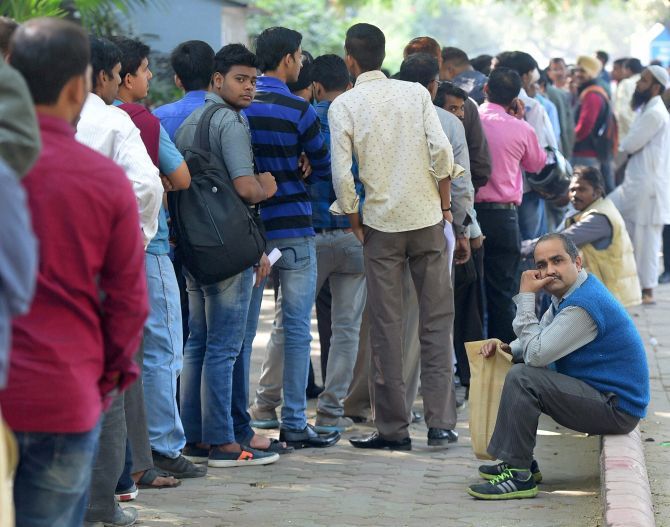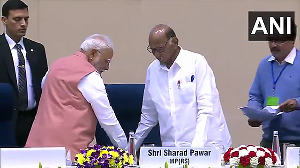'High denomination cash notes which was 1.4 lakh crores of Rs 500 and Rs 1,000 notes in 2004 became Rs 15.5 lakh crores in 2016.'
'If it had been allowed, by 2022, it would have been Rs 34 lakh crores, and that would have been the end of the Indian economy.'
'Demonetisation was a huge hit on the head of the economy, but without the hit, you could not U-turn the economy.'

Rashtriya Swayamsevak Sangh ideologue Swaminathan Gurumurthy became the editor of Thuglaq after its legendary editor Cho Ramaswamy's death. It was Cho's wish that Gurumurthy take over the mantle from him./p>
Gurmurthy assesses three years of the Modi government in this typically eloquent interview with Rediff.com's Shobha Warrier.
The Modi government has completed 3 years. Do you think it has fulfilled some of the promises it had made in 2014?
The Narendra Modi government is not to be judged by the election manifesto, which is the party's approach for 5 years of governance.
The governance deficit left behind by the UPA (United Progressive Alliance) which the Modi government faced is something unprecedented.
To some extent, it could be compared to the 1991 situation.
In addition to the trust deficit, governance deficit, fiscal deficit and external deficit, Narendra Modi's image was intentionally tarnished even outside India -- by the Opposition, the media and others -- as a person who is the Hindu version of Hitler.
Narendra Modi started with a minus 5; not on a clean slate.
No other prime minister had to face this challenge, to set right his image for which enormous amount of time had to be invested.
How could all this be captured in comparing his performance with his election manifesto?
The manifesto could hardly be expected to say if elected Modi would face that challenge, which would be actually a point against him, but that was deliberately created against him by his detractors over a decade and more.
He successfully corrected his image and went on to emerge as a world leader, and in the process he has lifted the image and status of India too.
Because the media focus has been on very shallow and limited areas, the achievements the Modi government have not been discussed.
One is the shift in India's position in the world and our capacity to deal with the world.
This shift has been noticed only in very limited quarters.
Today he is one of the tallest leaders of the world, having personal and even philosophic rapport with other world leaders.
This has happened in the history of India after perhaps Pandit Nehru.
While Nehru had all the advantages, this man had none; in fact he had only enforced disadvantages.
You spoke of all the deficits like fiscal deficit, governance deficit, trust deficit etc. Do you think the government should have come out with a white paper on all this?
No, he should not have.
But the neutral opinion makers should have done that, but there was none.
He has very few supporters and most of the intellectuals, economists and the rest were opposed to him.
I will tell you why the Modi government could not have done that -- except at the nation's cost.
In 1989, when Madhu Dandavate became finance minister, he first made a declaration that the government was bankrupt.
It affected India badly.
And India never recovered when the world underwent the huge crisis of shift from socialism to globalism.
In trying to expose the previous government, you would be damaging the country if you spoke the truth.
If impartial writers had written about the condition, it would have been different.
Because of the various scams that had happened during UPA rule, there was a huge burden on the government and industry.
Because of the coal and 2G scams, there was huge debt in the telecom, infrastructure and power sectors. Banks suffered from NPAs (non performing assets).
The NPA problem that started late in the UPA tenure deepened as Modi assumed office and exploded.
All this is because of the scams. It still continues.
Political control over lending in the UPA's time also had caused irresponsible lending, besides the scam.
If you said all these happened because of the previous government, you would be exposing your banking system.
So, no government which looks at the national interest could have tried to gain political advantage over the opponent at the cost of the country.
That is why I don't agree with the suggestion that the government should have come out with a white paper which would have damaged the confidence in the economy.
But I do feel that during the Budget speech the finance minister could have made broad references to the problems left behind by the previous government.
Expectations were high as he had promised millions of jobs. But today when the economy is experiencing jobless growth, how will he meet the expectations of the young of the country?
Jobless growth has been a phenomenon of India from 2004.
Between 2004 and 2011, the average GDP growth rate was around 8%, but the number of jobs added was only 21 lakhs (2.1 million).
Jobless growth continues because of the focus on the financial real estate sector during the UPA period, which led to asset inflection-led growth.
There was no focus on employment driven micro industries sector, the MSMEs.
In addition due to the huge potential and actual NPAs left behind by the UPA the banking system has weakened and could not start normal lending.
Unless you recreate the lending cycle, not only will money not flow into industry and business, but lending for the micro industries too would not start.
The anti-corruption law has not been amended so as to leave judgemental errors as crimes.
80% of India's banking system constitutes the public sector banks.
Even for the Make in India programme to be successful, the lending cycle has to start.
The two full year delay in the lending cycle since 2015 is because of the NPA problem which is the creation of the previous government.
You cannot solve the NPA problem in 3 years.
It took 7 years for Japan to solve the NPA problem.
The Mudra Yojana on the lines of the NHB (National Housing Bank) was conceived for lending to micro units, but the RBI stopped it as it did not want the regulation to slip out of its hand like it happened in the case of the NHB.
But the current banking system will not be able to handle it partly because it lacks the soil to lend and recover from this sector, but also because it is under the pressure of the NPAs.
Is it not a vicious cycle?
Yes, but at least the steel sector has been set right.
This takes efforts in a democracy. You cannot put the entire responsibility on the government.
The RBI may take a particular position and the government has to respect the independence of the RBI.
For example, the government was unable to compel the RBI to approve the Mudra Yojana.
The government had to take a decision to de-fatten the economy through demonetisation.
Demonetisation is actually de-fattening of the economy because the uncontrolled cash component had become the fat in the economy.
There was no way they could have removed the fat except through demonetisation.
The jobless growth of the past had been achieved by asset price inflation in stocks, real estate and gold.
You cannot contain asset price inflation unless you withdraw cash.
I am not saying that the entire economy will shift to a cashless economy; it will be a less cash economy.
The cash component had been pushing up three sectors -- real estate, stock, and gold whose prices rose by over 300% in five years to 2009, whereas they rose by less than 40% in five years to 2004.
What happened by way of bank lending in countries like America, ending in the 2008 collapse was happening between 2004 and 2009 because of cash in India.
The banking system was controlled and so asset price inflation through banks was not possible.
So, cash funding was doing it.
High denomination cash notes which was 1.4 lakh crores of Rs 500 and Rs 1,000 notes in 2004 became Rs 15.5 lakh crores in 2016.
If it had been allowed, by 2022, it would have been Rs 34 lakh crores, and that would have been the end of the Indian economy.
Demonetisation was a huge hit on the head of the economy, but without the hit, you could not U-turn the economy.
Speaking on demonetisation, Dr Manmohan Singh said the economy would collapse.
A person like him talking like this was so bad for the country, but did anyone ask him today, why didn't the economy collapse?
There was no political or media discourse on what was done by Modi to undo the past damage.
But how long can a government talk about the past?
For the people, what is more important is the delivery of promises.
It is surprising to see the media talking about ordinary people.
They always talk of liberals, LGBT and against tradition and religion.
The ordinary people will vote against Narendra Modi if he didn't deliver his promises, that's all.
The ordinary people you are talking about are supporting him today.
On one side, intellectuals complain that the media has become Modi's mouthpiece and does not question him. On the other side, you say the media is against him.
The media is not questioning him today is because there are no questions to raise.
They said for one whole year, it was an intolerant government, but nothing happened.
They then said it was not a liberal government, they failed.
These are not the questions ordinary people are interested in.
The anti-Narendra Modi media is an exotic media today. It wants to only throw mud on him.
Is not the media's job to question the government?
But then you should ask the right questions.
For example, demonetisation was questioned by all the world economists when it happened as they didn't know what was India, and our media quoted them.
The entire Indian media was obsessed with showing people standing in the queue.
20, 30 crore (200 million to 300 million) people stood in queue, but was there a single riot?
But the media wanted the riots to happen, even the Supreme Court was worried about riots.
Today, all the economists of the world are appreciating the move as a bold one. The chief economist of the European Union says it was a fantastic step.
Why do ordinary people support Modi?
That is because of his connect to the people
Are they mesmerised by Narendra Modi?
If people are mesmerised by Narendra Modi, it is because the media and intellectuals had mystified him.
When he stood in front of them and spoke to them, they found that he was a very normal person and he is no Hitler.
He is trying to set right policies and it takes time, and people are willing to wait as they feel it is an honest government.
- Part 2 of the Gurmurthy Interview: 'India is secular because it is Hindu'
IMAGE: People wait in a long queue to deposit Rs 500 and Rs 1,000 currency notes outside the RBI in New Delhi. Photograph: Manvender Vashist/PTI Photo











 © 2025
© 2025